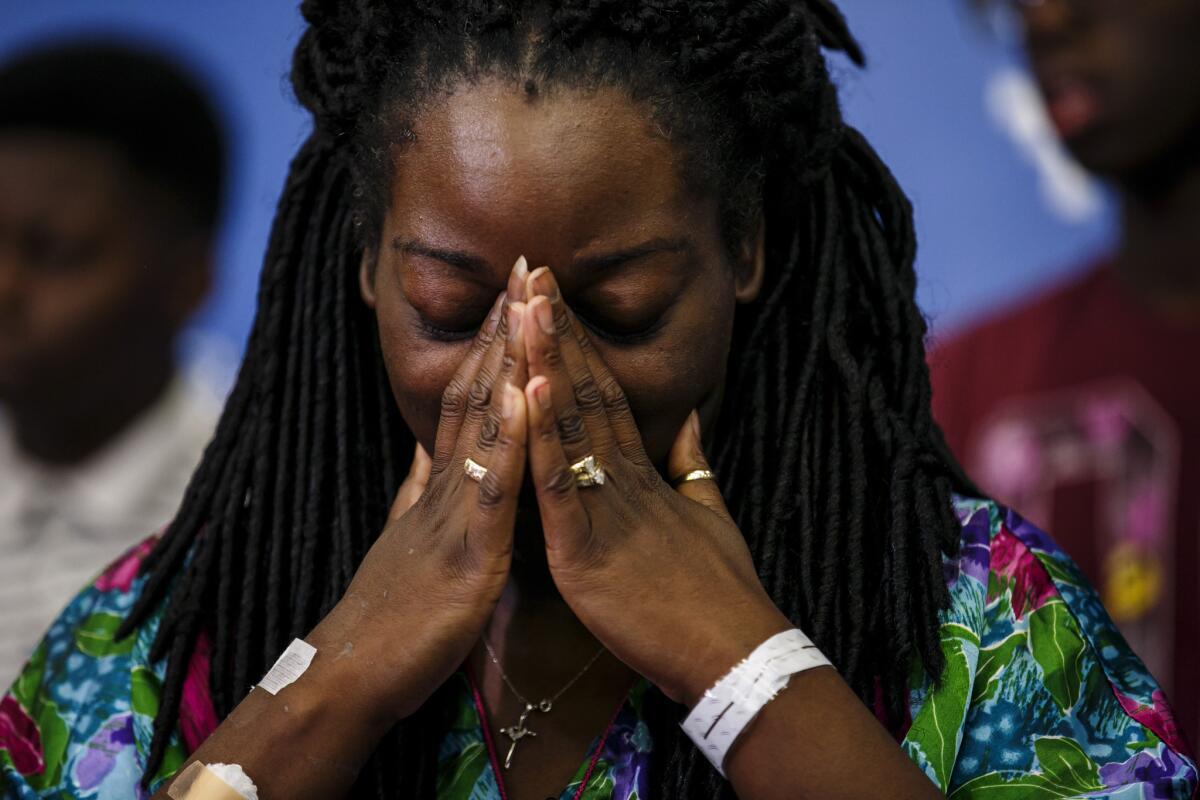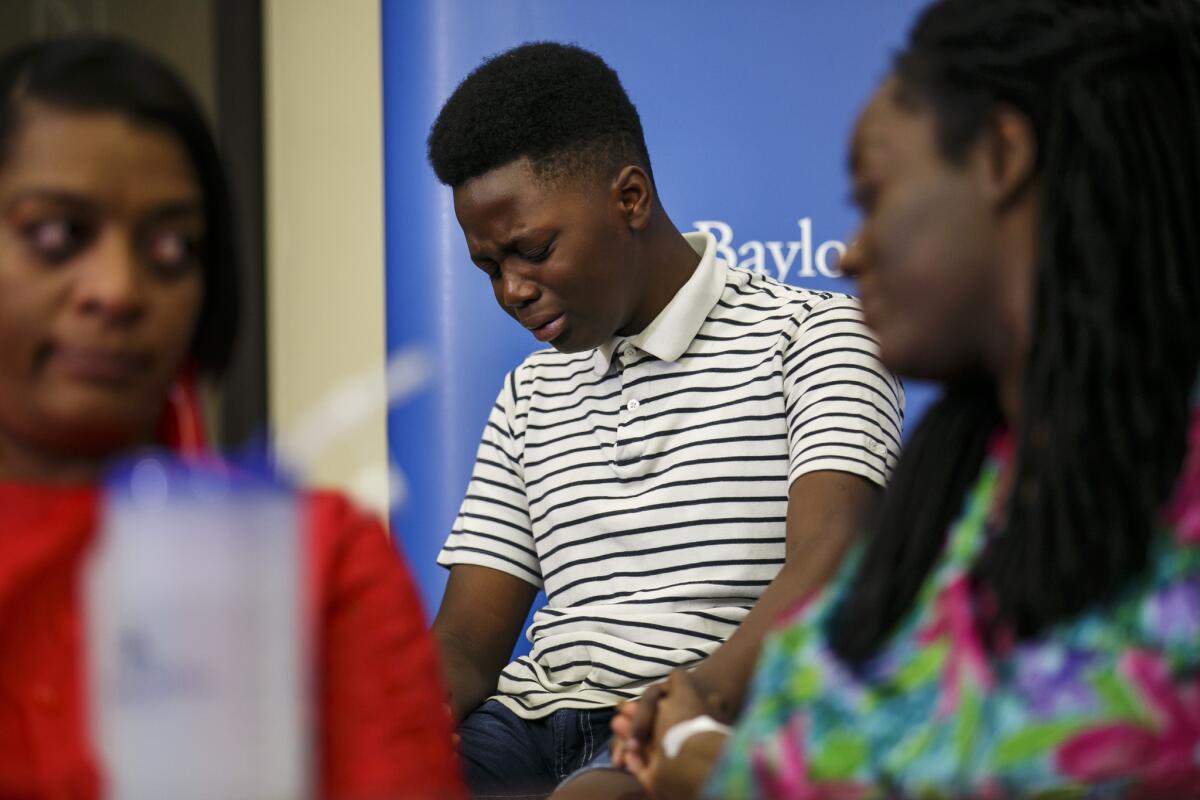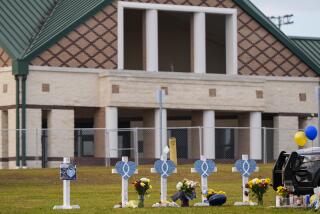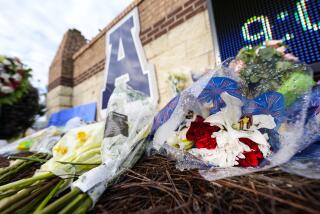She wasn’t a cop and she wasn’t white, but she took a bullet in Dallas while protecting her sons

Reporting from Dallas — When the shooting started at the Black Lives Matter protest here last week, Shetamia Taylor shouted at her four sons to run.
“They started running up the block and I was running behind them and I felt the bullet,” she said Sunday.
Taylor, 38, had been shot from behind, in her right calf. Still standing, she looked to a police officer ahead of her, a heavyset, balding white man.
Then he was shot, too.
“I saw him go down. When he got hit, he slumped over and he said ‘He has a gun, run!’ ” she said, recounting the incident from her wheelchair at Baylor Medical Center. She began to sob, covering her face.
It would take hours for Taylor to learn the fate of her sons – ages 12, 14, 15 and 18 – and of the dozen officers shot, five of them fatally, by 25-year-old Micah Xavier Johnson.
Johnson said he wanted to kill white people, especially white officers, in retribution for police killings of black men. But Taylor was neither white nor a police officer. She was a mother with four black sons, and she was determined that nothing would happen to them.
I was just laying on top of him. If it was going to happen to one of my sons, it was going to happen to me first.
— Shetamia Taylor
Taylor is not an activist. She and her family live in Garland, a Dallas suburb, and don’t know their way around downtown Dallas.
She tried to raise her sons right, instructing them to treat police with respect, but also to call home if they were ever stopped. Taylor admired police but was increasingly disturbed by the recent spate of police shootings involving black men, and feared for her boys. It had been her idea to go to the protest, the family’s first, which she saw announced on Facebook.
After she was shot, Taylor managed to grab her 15-year-old son, Andrew Humphrey, and push him between a car and the curb, shielding him with her body.
“I was just laying on top of him,” she said. “If it was going to happen to one of my sons, it was going to happen to me first.”
She watched police stream up the block toward them -- and the shooting. One of them shouted, “Is anybody hit?’”
Andrew yelled no, unaware that his mother was injured.
Taylor didn’t want to alarm him, and called out quietly to one of the officers, “Yes, sir, I’m hit in my leg!”
Police rushed over, most of them white officers, and jumped on top of Taylor and her son. “There was another one at our feet and another one over our head and several of them lying against a wall. And they just stayed there with us,” she said. “I had never seen anything like that before, the way they came around us and guarded us like that.”
Andrew was crying for police to move them, but they said it wasn’t safe.
As they lay on the concrete, pinned down by gunfire, Taylor saw another police officer get struck. She still doesn’t know if the two officers who were shot in front of her lived through the night.
“It was hundreds of rounds,” she said, “shots all around us.”
Soon after, police decided it was time to escape to a nearby patrol car, which Taylor could see was already “riddled with bullets.”
By the time they reached Baylor Medical Center, she said, the car’s tires were flat and they were driving “on rims only.” Outside the emergency room, Taylor could see a police officer on a gurney.
“I just kept praying for everyone: for my sons to be safe, for the officers,” she said.
When the shooting first erupted, Taylor had glimpsed her eldest son, Kavion Washington, grab 12-year-old Jermar and pull him into a garage entrance. They ducked behind a stone pillar.

Jermar, who had always wanted to be a police officer, was stunned. Moments before, while marching, he had beamed to his mother, saying, “I’m making history!”
“I had never heard a gunshot or even seen a real gun,” he said, only “in video games.”
Now police were directing him to sprint through the garage to safety.
“I was scared and didn’t really know what was going to happen,” Jermar said, his voice shaking.
“A police officer ran up and said ‘Go, I’ll cover you,’” Kavion recalled. “He was really selfless and put himself in harm’s way to protect us.”
They ran and joined the crowd of protesters fleeing downtown. Kavion’s cellphone battery had died, and although strangers offered to let him use their phones, he couldn’t remember his mother’s number.
Finally they reached Union Station, where someone loaned Kavion a phone charger and he was able to call his mother.
Andrew answered.
“That was just a relief to hear his voice,” Kavion said, until he heard the news: “We’re at the hospital.”
“Is Jajuan with you?” Kavion asked.
He wasn’t.
“Then we both sort of started to panic.”
When the shooting started, Jajuan, 14, ran several blocks away, then stopped, lost.
“Get to safety!” a woman told him.
But he didn’t know how, “and I didn’t want to be by myself.”
Angie Wisner, 33, a mother of three – including two sons – did what she figured any mother would do for a lost child: tried to reunite him with his family.
Jajuan had dropped his cellphone and hers was dead, so she suggested they head for her truck to charge it and try calling. At one point, they borrowed a stranger’s phone, but Jajuan’s mother was in surgery and did not answer. Another stranger let them into an apartment building to charge Wisner’s phone, which they eventually used to make an appeal on Facebook Live and Snapchat.
“We all was looking for each other but we couldn’t connect the dots,” Wisner said Sunday while meeting with the family at the hospital.
Jajuan finally reached a cousin, who told him his mother had been shot.
“He just folded over,” shaking, thinking his mother might be dead, Wisner said. She tried to reassure him. “Maybe she just got shot in the leg,” she said as his cousin arrived to drive him to the hospital.
The bullet had indeed fractured a bone in Taylor’s leg, but a surgeon repaired it with a metal plate and screws and said she would be able to walk in a few months.
But Taylor’s biggest concern was the safety of her sons.
She was relieved when Andrew finally told her: “They found all three and they are all OK.”
Just then, she looked up to see a police officer delivering bad news to a colleague.
“I’m celebrating my kids being alive and I’m listening to them say how an officer didn’t make it,” Taylor recounted Sunday at the hospital, surrounded by her sons and other family.
“It hurt,” she said. “Of course I’m thankful that my babies are OK. But somebody’s dad, somebody’s husband, isn’t.”
Twitter: @mollyhf
READ MORE
Dallas police chief says shooter planned larger attacks on officers
Obama urges Americans to ‘listen to each other’ and avoid heated rhetoric
Black man found hanging in Atlanta park stirs fear and ugly memories
More to Read
Sign up for Essential California
The most important California stories and recommendations in your inbox every morning.
You may occasionally receive promotional content from the Los Angeles Times.











